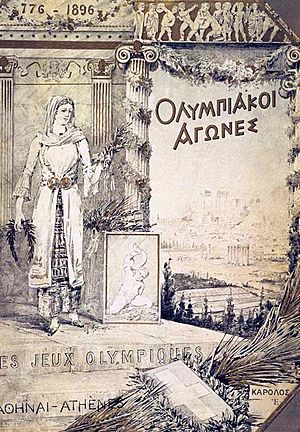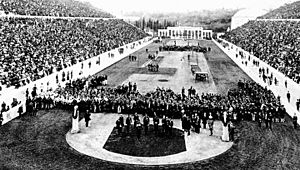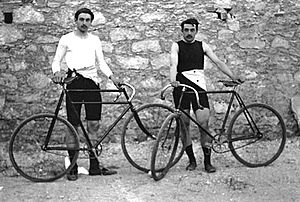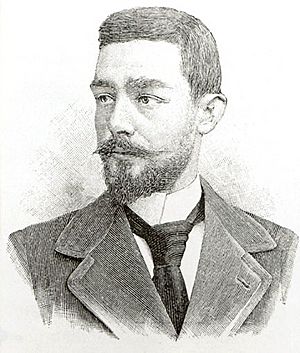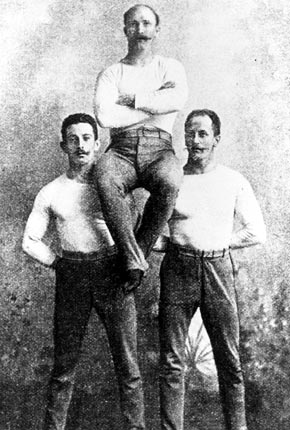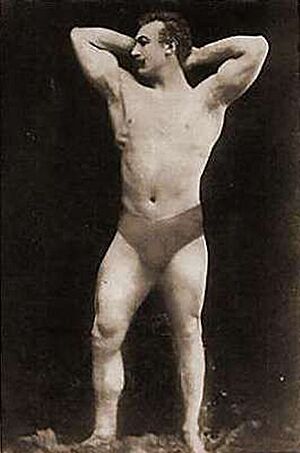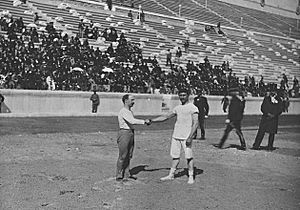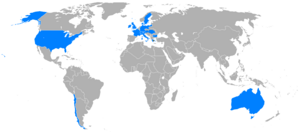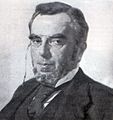1896 Summer Olympics facts for kids
The 1896 Summer Olympics, also known as the Games of the I Olympiad, were held in Athens, Greece. These games took place from April 6 to 15, 1896. They were the first international Olympic Games to be held in the Modern era. Since Ancient Greece was where the original Olympic Games began, Athens was a perfect choice for these first modern games. The International Olympic Committee (IOC) was also created during this time.
The 1896 Olympics were a big success, even with many challenges. More countries participated in these Games than in any other sports event before. The Panathinaiko Stadium, the only Olympic stadium used in the 1800s, was packed with the biggest crowd ever for a sports event. A major highlight for the Greeks was the marathon victory by Spyridon Louis. The most successful athlete was German wrestler and gymnast Carl Schuhmann, who won four events.
After the Games, many important people, including Greece's King George and some American athletes, asked that all future Games be held in Athens. However, the 1900 Summer Olympics were already planned for Paris. The Olympics did not return to Greece until the 2004 Summer Olympics, 108 years later, except for the Intercalated Games of 1906.
The story of these Games was even made into a 1984 NBC miniseries called The First Olympics: Athens, 1896.
Contents
Bringing Back the Olympic Games
In the 1700s, some small sports events in Europe were named after the Ancient Olympic Games. For example, the 1870 Olympics at the Panathenaic Stadium had 30,000 people watching. Pierre de Coubertin was inspired by Dr. William Penny Brookes' idea for a multi-country sports event. The ancient games were international in a way, as different Greek city-states and colonies took part. However, only free male athletes of Greek origin could compete.
In 1890, Coubertin wrote an article about the importance of Much Wenlock. This was a small town in England where, in 1850, a local physician named William Penny Brookes started the Wenlock Olympian Society Annual Games. This festival included athletics and team sports like cricket and football. Coubertin also got ideas from earlier Greek games called Olympics, organized by businessman Evangelis Zappas in 1859, 1870, and 1875.
The 1896 Athens Games were paid for by money left by Evangelis Zappas and his cousin Konstantinos Zappas. George Averoff also helped, as the Greek government asked him to pay for fixing up the Panathinaiko Stadium again. The Greek government did fix the stadium, even though Evangelis Zappas had already paid for its marble renovation forty years earlier.
With deep feeling towards Baron de Coubertin's courteous petition, I send him and the members of the Congress, with my sincere thanks, my best wishes for the revival of the Olympic Games.
On June 18, 1894, Coubertin gathered a group at the Sorbonne in Paris. He presented his plans to sports leaders from 11 countries. After his idea was accepted, they needed to pick a date for the first modern Olympic Games. Coubertin suggested holding the Games at the same time as the 1900 Universal Exposition in Paris. However, others worried that a six-year wait might make people lose interest. So, they chose 1896 instead.
Once the date was set, they picked a host city. Since Greece was the original home of the Olympics, everyone agreed that Athens should host. Demetrius Vikelas was then chosen as the first president of the new International Olympic Committee (IOC).
Olympic Venues
The 1896 Olympic Games used several places around Athens for the different sports. Here's where the events took place:
| Venue | Sports Held | Capacity |
|---|---|---|
| Panathinaiko Stadium | Athletics, Gymnastics, Weightlifting and Wrestling | 80,000 |
| Bay of Zea | Swimming | |
| Athens Lawn Tennis Club | Tennis | |
| Kallithea | Shooting | |
| Neo Phaliron Velodrome | Cycling | |
| Zappeion | Fencing |
Opening Ceremony
On April 6, 1896, the first modern Olympic Games officially began. This day was special because it was Easter Monday for both Western and Eastern Christian churches. It was also the anniversary of Greece's independence. The Panathinaiko Stadium was full with about 80,000 people. King George I of Greece, his wife Olga, and their sons were there.
Most of the athletes stood on the field, grouped by their countries. After a speech by Crown Prince Constantine, his father, King George, officially opened the Games. He said:
"I declare the opening of the first international Olympic Games in Athens. Long live the Nation. Long live the Greek people."
After this, nine bands and 150 choir singers performed an Olympic Hymn. It was composed by Spyridon Samaras with words by poet Kostis Palamas. For many years, different music was played at the opening ceremonies. But in 1958, the IOC decided that the Samaras/Palamas song would be the official Olympic Anthem. Other parts of today's opening ceremonies were added later. For example, the Olympic flame was first lit in 1928. The first athletes' oath was taken in 1920, and the first officials' oath in 1972.
Sports and Events
At the 1894 meeting in Paris, many sports were suggested for the Athens Games. Some early announcements mentioned sports like football and cricket. However, these plans were never finished, so those sports were not part of the final Games. Rowing and yachting were planned but had to be canceled because of bad weather on the competition day.
Athletics
The athletics events had the most international athletes. The biggest highlight was the marathon, which was held for the first time in an international competition. Spyridon Louis was the only Greek athletics champion, and he became a national hero. Greece had hoped to win the discus or the shotput. However, the best Greek athletes finished just behind American Robert Garrett in both events.
No world records were set at these Games. This was partly because few top international athletes chose to compete. Also, the track's curves were very tight, making it hard to run fast times. Despite this, Thomas Burke from the United States won the 100-meter race in 12.0 seconds. He also won the 400-meter race in 54.2 seconds. Burke was the only one who used the "crouch start" (putting his knee on the ground). This confused the judges, but he was allowed to start from his "uncomfortable position."
Cycling
The cycling competitions followed the rules of the International Cycling Association. The track cycling events were held at the new Neo Phaliron Velodrome. Only one road event took place, which was a race from Athens to Marathon and back, covering 87 kilometers.
In the track events, the best cyclist was Frenchman Paul Masson. He won the one-lap time trial, the sprint event, and the 10,000 meters. In the 100-kilometers event, Masson helped his teammate Léon Flameng by setting the pace. Flameng won this event, even after falling. He also stopped to wait for his Greek opponent Georgios Kolettis to fix a bike problem. Austrian fencer Adolf Schmal won the 12-hour race, which only two cyclists finished. The road race was won by Aristidis Konstantinidis.
Fencing
The fencing events were held in the Zappeion building. This building was built with money from Evangelis Zappas to help bring back the ancient Olympic Games. Unlike other sports, where only amateurs could compete, professional fencers were allowed to take part in a separate event. These professionals were seen as gentlemen athletes, just like the amateurs.
Four fencing events were planned, but the épée event was canceled for unknown reasons. The foil event was won by Frenchman Eugène-Henri Gravelotte. He beat his countryman, Henri Callot, in the final. The other two events, the sabre and the masters foil, were won by Greek fencers. Leonidas Pyrgos, who won the masters foil, became the first Greek Olympic champion in the modern era.
Gymnastics
Gymnastics events took place on the field inside the Panathinaiko Stadium. Germany sent an 11-man team, and they won five of the eight events. This included both team events. In the team event on the horizontal bar, the German team had no opponents. Three Germans also won individual titles: Hermann Weingärtner won the horizontal bar, Alfred Flatow won the parallel bars, and Carl Schuhmann, who also did well in wrestling, won the vault. Louis Zutter, a gymnast from Switzerland, won the pommel horse. Greeks Ioannis Mitropoulos and Nikolaos Andriakopoulos won the rings and rope climbing events, respectively.
Shooting
The shooting competition was held at a range in Kallithea. There were five events: two using a rifle and three with a pistol. The first event, the military rifle, was won by Pantelis Karasevdas. He was the only competitor to hit the target with all his shots. The second event, for military pistols, was dominated by two American brothers: John and Sumner Paine. They were the first siblings to finish first and second in the same event. To avoid embarrassing their hosts, the brothers decided that only one of them would compete in the next pistol event, the free pistol. Sumner Paine won that event.
The Paine brothers did not compete in the 25-meter pistol event. The judges decided their weapons were not the right size. Without them, Ioannis Phrangoudis won. The final event, the free rifle, started on the same day. However, it was not finished because it got too dark. It was completed the next morning, and Georgios Orphanidis became the champion.
Swimming
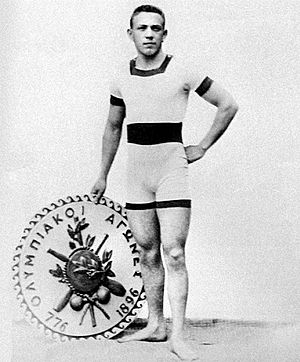
The swimming competition was held in the open sea. Nearly 20,000 people watched the events from the Bay of Zea near the Piraeus coast. The water in the bay was cold, and the swimmers struggled during their races. There were three open events for men: 100-meter freestyle, 500-meter freestyle, and 1200-meter freestyle. There was also a special event just for Greek sailors. All these events were held on the same day, April 11.
For Alfréd Hajós of Hungary, being on the same day meant he could only compete in two events. He won both events he swam in: the 100 and 1200-meter freestyle. Hajós later became one of only two Olympians to win a medal in both sports and artistic competitions. He won a silver medal for architecture in 1924. The 500-meter freestyle was won by Austrian swimmer Paul Neumann. He beat his opponents by more than a minute and a half.
Tennis
Tennis was already a popular sport by the late 1800s. However, none of the very best players came to the tournament in Athens. The competition was held at the courts of the Athens Lawn Tennis Club. It also used the field inside the velodrome where cycling events took place. John Pius Boland, who won the event, was entered into the competition by a fellow student from Oxford.
In the first round, Boland defeated Friedrich Traun, a good tennis player from Hamburg. Traun had already been eliminated from the 100-meter sprint. Boland and Traun then decided to team up for the doubles event. They reached the final and beat their Greek and Egyptian opponents after losing the first set.
Weightlifting
The sport of weightlifting was quite new in 1896, and the rules were different from today's. Competitions were held outdoors, on the field inside the main stadium. There were no weight limits for athletes. The first event was in a style now called the "clean and jerk". Two competitors stood out: Scotsman Launceston Elliot and Viggo Jensen of Denmark. Both lifted the same weight. However, the judges, with Prince George as chairman, decided that Jensen had done it with better style.
The British team protested this tie-breaking rule, as they were not familiar with it. The lifters were allowed to try again, but neither improved. Jensen was declared the champion. Elliot won the one-hand lift event, which happened right after the two-handed one. Jensen had been slightly hurt during his last two-handed attempt. He was no match for Elliot, who won easily. The Greek audience loved the Scottish winner, finding him very handsome. A funny thing happened during the weightlifting: a servant was told to move the weights, which seemed hard for him. Prince George came to help. He picked up the weight and threw it a good distance easily, making the crowd cheer.
Wrestling
There were no weight classes for the wrestling competition, which was held in the Panathinaiko Stadium. This meant there would be only one winner among wrestlers of all sizes. The rules were similar to modern Greco-Roman wrestling. However, there was no time limit, and not all leg holds were forbidden (unlike today's rules).
Besides the two Greek contestants, all the other competitors had also taken part in other sports. Weightlifting champion Launceston Elliot faced gymnastics champion Carl Schuhmann. Schuhmann won and moved on to the final. There, he met Georgios Tsitas, who had beaten Stephanos Christopoulos. Darkness forced the final match to stop after 40 minutes. It continued the next day, and Schuhmann needed only 15 minutes to win the match.
Closing Ceremony
On the morning of Sunday, April 12, King George held a special dinner for officials and athletes. During his speech, he said he believed the Olympics should always be held in Athens. The official closing ceremony was held the following Wednesday. It had been delayed from Tuesday because of rain. The royal family again attended the ceremony. It began with the national anthem of Greece and a poem written in ancient Greek by George S. Robertson, a British athlete and scholar.
Afterward, the king gave prizes to the winners. Unlike today, first-place winners received silver medals, an olive branch, and a diploma. Athletes who came in second received copper medals, a laurel branch, and a diploma. Third-place winners did not get a medal. Some winners also received extra prizes. For example, Spyridon Louis received a cup from Michel Bréal, a friend of Coubertin, who had thought of the marathon event. Louis then led the medalists on a lap of honor around the stadium, while the Olympic Hymn played again. The King then officially announced that the first Olympiad was over. He left the Stadium as the band played the Greek national hymn and the crowd cheered.
Like the Greek king, many others wanted the next Games to be held in Athens. Most of the American competitors signed a letter to the Crown Prince saying this. However, Coubertin was strongly against this idea. He believed that the modern Olympics should move to different countries each time. As he wished, the next Games were held in Paris. However, they were somewhat overshadowed by the Universal Exposition happening at the same time.
Participating Countries
A total of 14 countries sent athletes to compete at the Athens games.
| Summer Games: 1896, 1900, 1904, 1906, 1908, 1912, (1916), 1920, 1924, 1928, 1932, 1936, (1940), (1944), 1948, 1952, 1956, 1960, 1964, 1968, 1972, 1976, 1980, 1984, 1988, 1992, 1996, 2000, 2004, 2008, 2012, 2016, 2020, 2024, 2028 |
||
| Winter Games: 1924, 1928, 1932, 1936, (1940), (1944), 1948, 1952, 1956, 1960, 1964, 1968, 1972, 1976, 1980, 1984, 1988, 1992, 1994, 1998, 2002, 2006, 2010, 2014, 2018, 2022 | ||
| Athens 2004 — Turin 2006 — Beijing 2008 — Vancouver 2010 — London 2012 — Sochi 2014 — Rio 2016 — Pyeongchang 2018 — Tokyo 2020 Games in italics will be held in the future, and those in (brackets) were cancelled because of war. See also: Ancient Olympic Games |
||
| Summer Games: 2010, 2014, 2018 | ||
| Winter Games: 2012, 2016, 2020 |
||
| Singapore 2010 — Innsbruck 2012 — Nanjing 2014 |
||
Images for kids
-
Demetrius Vikelas, the first president of the International Olympic Committee. He helped make the 1896 Games a success.
-
A silver medal was given to the winner of each event. The system of gold, silver, and bronze medals started later, in the 1906 Olympic Games.
See also
 In Spanish: Juegos Olímpicos de Atenas 1896 para niños
In Spanish: Juegos Olímpicos de Atenas 1896 para niños
 | May Edward Chinn |
 | Rebecca Cole |
 | Alexa Canady |
 | Dorothy Lavinia Brown |


